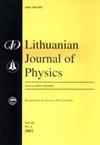Terahertz bow-tie diode based on asymmetrically shaped AlGaN/GaN heterostructures
IF 0.3
4区 物理与天体物理
Q4 PHYSICS, MULTIDISCIPLINARY
引用次数: 0
Abstract
Asymmetrical shaping of AlGaN/GaN heterostructures containing a conductive layer of two-dimensional electron gas (2DEG) was used for the development of bow-tie (BT) diodes for room temperature terahertz (THz) detection. Considering operation of the THz BT diode in the unbiased mode as preferable for practical applications, we investigated the diodes with an obvious asymmetry of IV characteristics, which was found to be more pronounced with the decrease of an apex width, resulting in the sensitive THz detection. A nonuniform heating of carriers in a metalized leaf of the BT diode was attributed as the main mechanism that caused the rectification of THz waves. The responsivity and noise-equivalent power (NEP) at the fundamental antenna frequency of 150 GHz were up to 4 V/W and 2 nW/√Hz, respectively. Such high sensitivity of BT diodes allowed us to measure for the first time the response spectrum of the asymmetric BT antenna demonstrating fundamental and higher order resonances in good agreement with finite-difference time-domain simulation data in a broad spectrum range. The detailed investigation of the lowand high-frequency noise characteristics of AlGaN/GaN BT diodes revealed that only thermal noise needs to be considered for the unbiased operation, the value of which was relatively low due to a high density of 2DEG enabling low resistivity values. Moreover, we observed that the responsivity of BT diode scales with its resistance, revealing that tapering of the diode apex below a few microns could be ineffective in applications which require low NEP values.基于非对称形状氮化铝/氮化镓异质结构的太赫兹弓形二极管
含有二维电子气体(2DEG)导电层的 AlGaN/GaN 异质结构的非对称成型被用于开发用于室温太赫兹(THz)探测的弓形领带(BT)二极管。考虑到太赫兹 BT 二极管在无偏压模式下工作更适合实际应用,我们研究了 IV 特性明显不对称的二极管,发现这种不对称随着顶点宽度的减小而更加明显,从而实现了灵敏的太赫兹检测。BT 二极管金属化叶片中载流子的不均匀加热是导致太赫兹波整流的主要机制。在 150 GHz 的天线基频上,响应率和噪声等效功率(NEP)分别高达 4 V/W 和 2 nW/√Hz。BT 二极管的灵敏度如此之高,使我们得以首次测量非对称 BT 天线的响应频谱,该频谱显示了基阶和高阶谐振,与宽频谱范围内的有限差分时域仿真数据十分吻合。对 AlGaN/GaN BT 二极管低频和高频噪声特性的详细研究表明,在无偏操作中只需考虑热噪声,由于 2DEG 密度高,电阻率值低,因此热噪声值相对较低。此外,我们还观察到 BT 二极管的响应率与电阻成正比,这表明在需要低 NEP 值的应用中,将二极管顶点缩小到几微米以下可能是无效的。
本文章由计算机程序翻译,如有差异,请以英文原文为准。
求助全文
约1分钟内获得全文
求助全文
来源期刊

Lithuanian Journal of Physics
物理-物理:综合
CiteScore
0.90
自引率
16.70%
发文量
21
审稿时长
>12 weeks
期刊介绍:
The main aim of the Lithuanian Journal of Physics is to reflect the most recent advances in various fields of theoretical, experimental, and applied physics, including: mathematical and computational physics; subatomic physics; atoms and molecules; chemical physics; electrodynamics and wave processes; nonlinear and coherent optics; spectroscopy.
 求助内容:
求助内容: 应助结果提醒方式:
应助结果提醒方式:


